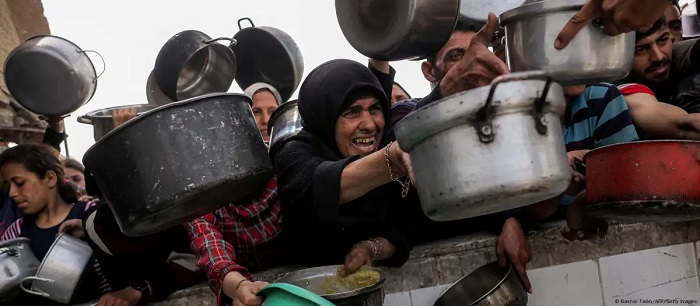
The UN World Food Programme on Friday said it had "delivered its last remaining food stocks to hot-meals kitchens in the Gaza Strip" after being unable to replenish supplies in the enclave during a seven-week blockade by Israel.
"These kitchens," according to the WFP, "are expected to fully run out of food in the coming days."
The UN humanitarian agency OCHA called the situation in Gaza "probably the worst" it has been in the 18 months since Israel began its military campaign against Hamas, which many nations define as a terrorist outfit. The group perpetrated the October 7, 2023, attacks in Israel that killed nearly 1,200 people and saw another 250 taken hostage.
Food shortages have been common since the war in Gaza began, with aid deliveries regularly blocked. Most recently, Israel blocked deliveries after a stalemate over ceasefire negotiations that began in January.
Israel also resumed bombing the strip on March 18, before launching a renewed ground offensive.
More than 2,000 Palestinians have been reportedly killed since then. On Friday, the Gaza Health Ministry, which is run by Hamas, said at least 78 Palestinians had been killed over the past 24 hours.
According to the Health Ministry, the current death toll in Gaza has climbed to 51,439.
Will Gazans starve to death because of the Israeli blockade?
Beyond bombardments and an ongoing ground offensive that has displaced most of Gaza's 2.3 million residents, the threat of starvation as a result of Israeli policies has become very real for the enclave's residents.
Aid agencies and foreign governments have joined the WFP in voicing alarm over the deteriorating situation.
On Wednesday, the foreign ministers of France, Germany and the United Kingdom called for an end to Israel's blockade, warning of "an acute risk of starvation, epidemic disease and death." They said: "The Israeli decision to block aid from entering Gaza is intolerable."
The heads of 12 major aid agencies last week said: "Famine is not just a risk but likely rapidly unfolding in almost all parts" of Gaza.
The WFP called the current blockade "the longest closure the Gaza Strip has ever faced, exacerbating already fragile markets and food systems."
"For weeks, hot-meal kitchens have been the only consistent source of food assistance for people in Gaza," the WFP said. "Despite reaching just half the population with only 25% of daily food needs, they have provided a critical lifeline."
The WFP added that the 25 bakeries it supplies in Gaza have been unable to provide food since March 31 because of a total lack of flour and cooking oil.
Israel accuses Hamas of exploiting aid
Hamas on Friday said: "Thousands of Palestinian families are now facing starvation after becoming unable to provide even a single meal for their children."
The group said 52 people, 50 of whom were children, had died of hunger and malnutrition since the conflict began and added that hundreds of thousands of children faced extreme hunger on a daily basis.
The WFP says food prices have skyrocketed 1,400% since the ceasefire collapsed.
Moreover, according t the WFP, more than 116,000 metric tons of food — enough to feed 1 million people for up to four months — is currently at the border and being kept out of the enclave by the Israeli blockade.
Israel has consistently denied that Gaza faces a food crisis, with its Foreign Ministry claiming that 25,000 aid vehicles entered Gaza during the 42-day ceasefire, which ended in March.
Israel has justified its blockades by claiming that Hamas uses aid as a tool to control the enclave's population, with Defense Minister Israel Katz saying the blockade would continue until Hamas releases hostages and the bodies of those who have died in captivity.
Israel says Hamas still holds 58 hostages, 24 of whom are thought to still be alive.